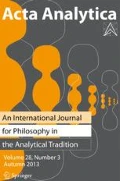Abstract
I show the incompatibility of two theses: (a) to desire the truth of p amounts to believing a certain proposition about the value of p’s truth; (b) one cannot be said to desire the truth of p if one believes that p is true. Thesis (a), the Desire-As-Belief Thesis, has received much attention since the late 1980s. Thesis (b) is an epistemic variant of Socrates’ remark in the Symposium that one cannot desire what one already has. It turns out that (a) and (b) cannot both be true if it is possible for there to exist an agent who has a desire initially, say the desire for the truth of p, and then expands the corpus of propositions she believes to include p. This result provides a new route to the denial of (a).
Similar content being viewed by others
Notes
The Ramsey test is the thesis that an agent believes or accepts the conditional ‘If p then q’ just in case the agent would believe q if his or her beliefs were revised to include p. Authors disagree about whether conditionals belong to the belief sets on which the revision operation is defined.
Note that K′′ need not be an expansion of K or an expansion of K′.
References
Arló-Costa, H., Collins, J., & Levi, I. (1995). Desire-as-belief implies opinionation or indifference. Analysis, 55(1), 2–5.
Collins, J. (1988). Belief, desire, and revision. Mind, 97(387), 333–342.
Davidson, D. (1978). Intending. In Y. Yovel (Ed.), Philosophy of history and action (pp. 41–60). Dordrecht and Jerusalem: D. Reidel and The Magnes Press, The Hebrew University. Reprinted in D. Davidson, Essays on actions and events (pp. 83–102). Oxford: The Clarendon Press, 1980. Page references are to the 1980 Davidson anthology.
Gärdenfors, P. (1986). Belief revisions and the Ramsey test for conditionals. Philosophical Review, 95(1), 81–93.
Hobbes, T. [1651] (1994). Leviathan (edited with introduction by E. Curley). Indianapolis: Hackett.
Howe, R. B. K. (1994). The cognitive nature of desire. Southern Journal of Philosophy, 32(2), 179–196.
Humberstone, I. L. (1987). Wanting as believing. Canadian Journal of Philosophy, 17(1), 49–62.
Jackson, F., Priest, G., Hájek, A., & Pettit, P. (2004). Desire beyond belief. Australasian Journal of Philosophy, 82(1), 77–92.
Jeffrey, R. (1983). The logic of decision, (2nd ed.). Chicago: University of Chicago Press.
Kenny, A. (1963). Action, emotion and will. London: Routledge and Kegan Paul.
Levi, I. (1979). Serious possibility. In E. Saarinen, I. Niiniluoto, R. Hilpinen, & M. Provence (Eds.), Essays in honour of Jaakko Hintikka: On the occasion of his fiftieth birthday, January 12, 1979 (pp. 219–236). Dordrecht: D. Reidel.
Levi, I. (1988). Iteration of conditionals and the Ramsey test. Synthese, 76(1), 49–81.
Lewis, D. (1988). Desire as belief. Mind, 47(387), 323–332.
Lewis, D. (1996). Desire as belief II. Mind, 105(418), 303–313.
Morreau, M. (1992). Epistemic semantics for counterfactuals. Journal of Philosophical Logic, 21(1), 33–62.
Plato [ca. 400BCE] (1989). Symposium (translated by A. Nehamas & P. Woodruff, with introduction and notes). Indianapolis: Hackett.
Price, H. (1989). Defending desire-as-belief. Mind, 98(389), 119–127.
Rott, H. (1989). Conditionals and theory change: revisions, expansions, and additions. Synthese, 81(1), 91–113.
Smith, M. (1987). The Humean theory of motivation. Mind, 96(381), 36–61.
Velleman, J. D. (1992). The guise of the good. Noûs, 26(1), 3–26.
Acknowledgments
For helpful comments I would like to thank Randolph Clarke and Steven Reynolds. For their support of this research I would like to thank the University of Georgia Research Foundation and the University of Georgia Center for Humanities and Arts.
Author information
Authors and Affiliations
Corresponding author
Rights and permissions
About this article
Cite this article
Cross, C.B. Nonbelief and the Desire-As-Belief Thesis. Acta Anal 23, 115–124 (2008). https://doi.org/10.1007/s12136-008-0026-0
Received:
Accepted:
Published:
Issue Date:
DOI: https://doi.org/10.1007/s12136-008-0026-0


